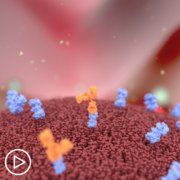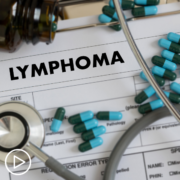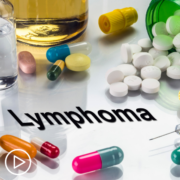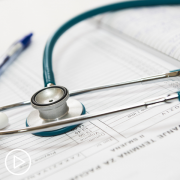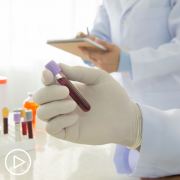How Are Bispecific Antibodies Being Used in Diffuse Large B-Cell Lymphoma Treatment?
How Are Bispecific Antibodies Being Used in Diffuse Large B-Cell Lymphoma Treatment? from Patient Empowerment Network on Vimeo.
How can diffuse large B-cell lymphoma (DLBCL) patients be helped with bispecific antibodies? Expert Dr. Nirav Shah from the Medical College of Wisconsin shares an explanation of bispecific antibodies and his perspective on potential approvals and how the treatment could serve additional DLBCL patients in the future.
Dr. Nirav Shah is an Associate Professor at the Medical College of Wisconsin. Learn more about Dr. Shah.
See More from [ACT]IVATED DLBCL
Download Resource Guide en español
Related Resources:
Transcript:
Lisa Hatfield:
In addition to things like CAR-T therapy, blood cancer, there’s a lot of progress being made in something called bispecific antibodies. Can you talk about that a little bit, how that’s being looked at with DLBCL?
Dr. Nirav N. Shah:
Yeah, so bispecific antibodies in a way are a drug-ish form of CAR T. So CAR T is complex, it involves collecting your immune system cells, reprogramming them, and often that involves sending them to a third party manufacturing site, that can sometimes take several weeks to manufacture, and the other issue with CAR T is that it’s limited in accessibility because it’s often only available in these larger regional centers, which often means a big city, and not everybody has access to that. Bispecific antibodies, I think are going to be really, really important therapies in diffuse large B-cell lymphoma, and I think other cancers as well.
What they do is they give you a drug molecule, an antibody that on one end binds the T-cell, which is sort of that immune effector cell, and on the other end, targets the cancer cell, which in this case is a B cell, so in a way, it sort of works like CAR T. Now, it is not CAR T, and I wouldn’t necessarily compare those two, but the exciting thing is that we’ve seen really, really nice outcomes with bispecific antibodies, and while we don’t have one approved in diffuse large B-cell lymphoma today, I anticipate that those drugs are going to be available and approved in the very near future.
And why is that important? Because these drugs can now be given anywhere because they’re a drug molecule. Again, sites will have to do some training and learn how to give them, but there’s a potential for them to be really administered at regional sites and at locations that don’t require patients to travel long distances to get access to CAR T. Now, I’m not saying that we should use one therapy in lieu of the other, we should always do the best therapy for the patient, but thinking about accessibility, it’ll be great to have another option available. And not only that, these drugs also have been shown to have efficacy in patients that have failed CAR T. So that gives us another sort of tool in our tool basket to use, while I mentioned that we’re giving more and more CAR T in the second line, as this therapy got approved in that setting, we now have another option with bispecific antibodies for patients that don’t respond to CAR T, and, unfortunately, not everybody does respond to CAR T-cell therapy. So very excited. I hope, and I think there’ll be an approval in diffuse large B-cell lymphoma later this year.
Share Your Feedback:
Create your own user feedback survey

